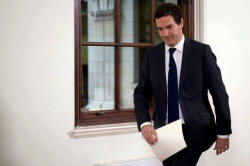|
Leave leaders back
Carney, Osborne as UK grapples with Brexit fallout
 Send a link to a friend
Send a link to a friend
 [June 27, 2016]
By William Schomberg and Ana Nicolaci da Costa [June 27, 2016]
By William Schomberg and Ana Nicolaci da Costa
LONDON (Reuters) - The leaders of the
campaign to get Britain out of the European Union sought to ease
concerns about the country's uncertain economic future by giving
public backing to Bank of England Governor Mark Carney and finance
minister George Osborne.
In the run-up to last week's referendum, Carney and Osborne incensed
Leave campaigners by warning that a vote to pull out of the EU would
hit the economy.
Carney faced a call for his resignation from one lawmaker from the
ruling Conservative Party during the campaign, and last week the
official Vote Leave campaign released a video attacking him over his
previous employment with Goldman Sachs.
But Boris Johnson, who is now considered the front-runner to become
Britain's next prime minister after steering the Leave campaign to
victory, used his first comments since the vote to heap praise on
the Canadian.
"Most sensible people can see that Bank of England Governor Mark
Carney has done a superb job - and now that the referendum is over,
he will be able to continue his work without being in the political
firing-line," Johnson wrote in the Daily Telegraph newspaper in a
column first published late on Sunday.

Justice minister Michael Gove, who led Vote Leave with Johnson,
praised Osborne for saying early on Monday that Britain would cope
with the turmoil caused by the referendum result.
"I listened to the chancellor and I found his words incredibly
reassuring," Gove told reporters. "The chancellor's statement today
provided the reassurance that people need."
"PROJECT FEAR IS OVER"
Johnson kept up the soothing tone on Monday morning, welcoming
Osborne's message at a 7am news conference that there would be no
rush for more austerity measures, despite having warned of higher
taxes and spending cuts during the campaign.
"It is clear now that 'Project Fear' is over, there is not going to
be an emergency budget, people’s pensions are safe, the pound is
stable, markets are stable, I think that is all very good news,"
Johnson said.
Investors are still alarmed by Thursday's vote for Britain to leave
the EU and the subsequent sense of political vacuum after Prime
Minister David Cameron said he would resign.
[to top of second column] |

Britain's Chancellor of the Exchequer George Osborne leaves after a
news conference in central London, Britain June 27, 2016.
REUTERS/Stefan Rousseau/Pool

Sterling fell by more than 8 percent against the dollar on Friday and was down
by a further 3 percent on Mondays. The yield on 10-year British government bonds
fell below 1 percent for the first time as investors sought safe places to put
their money.
Not everyone agreed that Carney should remain at the BoE, among them Nigel
Farage, leader of the UK Independence Party, which has campaigned to leave the
European Union for years.
"I don't think the governor of the Bank of England behaved in an independent
manner during this campaign at all," Farage told Canada's Globe and Mail
newspaper in an interview. "And I think there will be some real questions in
Parliament about whether it's appropriate for him to continue in that role."
Carney said in December he would decide by the end of this year whether to
extend his five-year contract at the BoE - which is due end in mid-2018 - to
eight years, the usual term served by governors at the Bank.
Philip Shaw, an economist with Investec, a bank, said it was very early to try
to map out a likely course of events given the high levels of uncertainty about
who will be running the country. "Those question marks might well extend to how
long Mark Carney remains Bank of England governor," he said.
(Additional reporting by William James, Kylie MacLellan and David Milliken;
Editing by Andrew Heavens)
[© 2016 Thomson Reuters. All rights
reserved.] Copyright 2016 Reuters. All rights reserved. This material may not be published,
broadcast, rewritten or redistributed.

 |